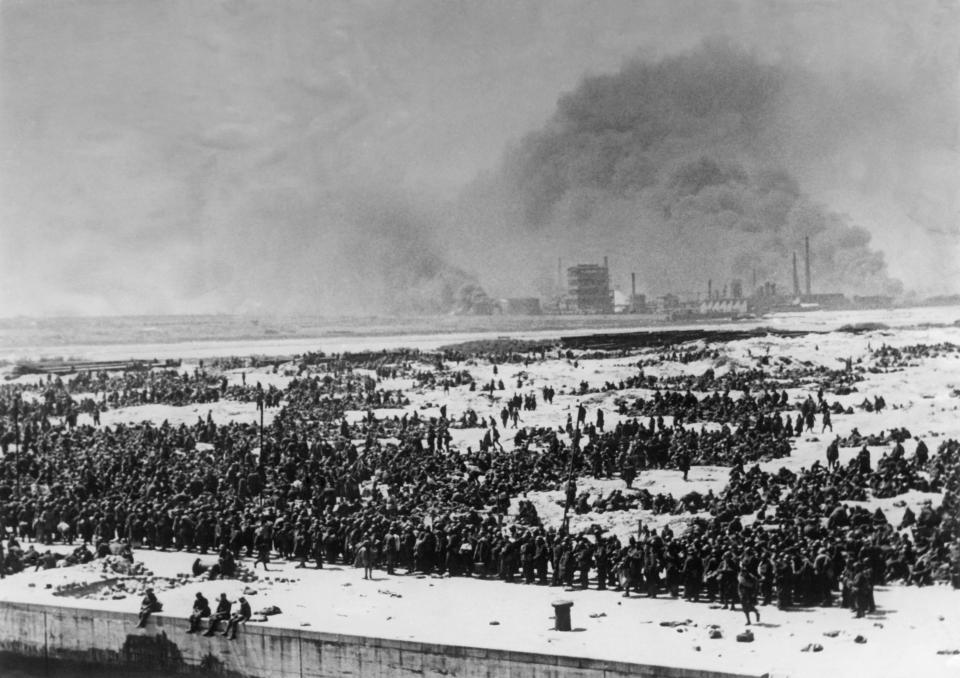By Jonathon Van Maren
It was on May 23, 1940, that King George VI put out the proclamation, requesting that the following Sunday, May 26, would be a National Day of Prayer. Britain was facing a crisis that threatened her very existence: Adolf Hitler’s Nazi lightning war had smashed through Belgium and France, driving the Allied armies back and trapping them on the beach at Dunkirk. More than 350,000 men, strafed by German planes, waited for destruction or rescue. Many of Britain’s military leaders thought it hopeless: the war was over, and the Nazi savages marching under the banner of the twisted cross would reign over Europe.
On the evening of Saturday, May 25, the order was given to evacuate as many troops from the Dunkirk beach as possible, and a call was put out for rescuers. The following morning, the churches were overflowing with men and women begging the Almighty to save their sons, their brothers, and their husbands. Long lineups stretched out the doors of the cathedrals and down the street. A crowd gathered at Westminster Abbey. A call was put out for rescuers to fetch their boys home, and the response again was overwhelming: Over 800 vessels, many of them yachts, merchant marine ships, and small fishing boats, heeded the call while those at home prayed for their safety.
It was then that what became known as the “Miracle of Dunkirk” occurred. Historians debate to this day why the Axis Powers paused in their advance on the beaches, but their delay was just what the rescuers needed. Over 338,000 men were loaded from the Dunkirk beaches onto ships of every size over the next three days, and ferried across the English Channel to safety. On June 2, the Dean of St. Paul’s was the first to refer to the massive evacuation as the “Miracle of Dunkirk”—as many pointed out, God had answered those pleading for His intervention by granting the rescuers a calm, quiet Channel and high mists and fog, which interfered with the ability of Nazi fighter planes to strafe the ships bearing their men home. These conditions allowed a rescue of epic proportions to take place.
It was later that people heard about another story of the Dunkirk rescues. Just as the trapped British soldiers on the beach seemed sure that they would be destroyed or captured by the oncoming Nazis, a British naval officer cabled three simple words to London: “But if not.”
Those three words tell us volumes about what it means to still be in possession of a Christian culture—they were derived from Daniel 3:17-18, the King James Version—which most Britons still heard in church and was still considered the pinnacle achievement of the English language. Those three words were spoken by the three brave friends of Daniel as they faced the scorching furnace of King Nebuchadnezzar, willing to be burned rather than serve an idol.
“Our God whom we serve,” they told him, “is able to deliver us from the fiery furnace, and he will deliver us out of thine hand, O king. But if not, let it be known unto thee, O king, that we will not serve thy gods, nor worship the golden image which thou hast set up.”
But if not. The British officer who sent those words to his superior fully expected them to understand where they came from in Scripture and what they would mean. God was yet able to deliver the British from what seemed a certain fate, but if not they would resist the Nazis with all their might. In three words, we get a glimpse of what a culture—derived from the word “cultus” or centre—actually looks like. That three seemingly innocuous words would be immediately recognized and their meaning understood shows again how far we are from there to here.
Even now, ironically, the story has become somewhat watered-down. I noticed that one Christian organization blogged about the story of the three words “And if not,” presumably from some other version of the Bible and an inaccurate rendering of the story which entirely misses the very British cultural significance of it. It is for this reason that even virulent atheists like Christopher Hitchens and Richard Dawkins, men who scorn prayer and deride Scripture, defend the King James Version as a masterpiece.
It is so foreign to us to read of a nation of men and women so literate in Scripture that three words could convey so much, especially in our post-Christian and in many ways post-cultural West. There is no set of values that holds us together any longer. There is no centre, no set of principles that our nations can rally around. The Bible is despised as hate speech and spurned as fairy tales rather than relied on as a source of wisdom and encouragement. Today, as barbarians again shed blood on the streets of Europe, the sons and daughters of those who saw the Miracle of Dunkirk ask not for a day of prayer, but demand that we remain prayerless.
But the Miracle of Dunkirk offers encouragement once again. Undeserving people can turn, pray, and beg—and God can yet do unspeakably amazing things. Throughout history, He has intervened in response to prayer, again and again. Those who have eyes to see can see this. It is something to remember. Our nations may have changed, and our cultures may have collapsed. But He remains the same.
_____________________________________
For anyone interested, my book on The Culture War, which analyzes the journey our culture has taken from the way it was to the way it is and examines the Sexual Revolution, hook-up culture, the rise of the porn plague, abortion, commodity culture, euthanasia, and the gay rights movement, is available for sale here.









dates wrong? march vs may?
The date is right as it was from May 26th to June 4th 1940.
An amazing retelling of historical relevance in this day and age. But with Gods will we can be turned back to him. Thank you for this.
Thank you! “Lest we forget” How God answered/answers prayer.
Thank you, Jonathan! My grandfather was killed at Dunkirk so there was no personal miracle for him. However, God was certainly on the beaches during those terrible days.
So sorry to hear that, John! Do you mind telling a bit more of your story?
The only thing that you can depend on Hollywood to do, is to tell the story with 5% accuracy, the rest is fiction. Thanks for reminding us that the reality is the Lord of Hosts is sovereign. Praise Him.
This is quite ironic, for Walter to suggest that Hollywood is inaccurate, posted as a comment to a story that appears to be complete fiction. The telegram story appeared for the first time in the mid 1990s, and there is no historical record of it. Walter Lord, who wrote the definitive book on the event, doesn’t mention it at all (the book was written in 1982, before the internet allowed for the proliferation of unsupported stories). If anyone can direct me to any reference to the alleged telegram before 1995, please let me know.
George F. Will references this story in an article for the Washington Post on May 6, 1984 titled Education of the Moment. https://www.washingtonpost.com/archive/opinions/1984/05/06/education-of-the-moment/db284215-c926-4a3b-967a-289a29055f7c/
Yes! ANd I am certain that I heard it from the pulpit in the 70s as a teen. It is odd that Lord doesn’t seem to know the story. Is it possible that it has survived by oral tradition from the 40s until the 70s?
I’m in the same camp as Mike Brooks – I cannot find any reference for this quote outside of Christian books & magazines – the earliest being Truth Magazine, 1994 – “But If Not” by Dick Lambert.
No article provides the name of the “British officer” who sent it, nor the name of the individual who received it.
Edith Humphrey, in her 2013 book “Scripture and Tradition – What the Bible Really Says” claims that the “entire British nation heard these words with appreciation” and that it galvanized citizens to send over their ships. If this is accurate, we should see a great many sources referencing this – and yet, I cannot find a single one.
I’d love for the story to be true, but at the moment it doesn’t appear to be.
I wouldn’t call Christopher Hitchens a Christian source: https://www.vanityfair.com/culture/2011/05/hitchens-201105?verso=true
Still haven’t seen anything prior to 1994. Hitchens did later write about it, but he too seems to have simply accepted it without evidence. While I am still curious as to how this tale began, I have no new source to report.
1984 is the earliest,George Will Washington Post. But I am sure I heard this as a teen from the pulpit in the 70s. I wish now I had not spoken of it as factual in my book. But it was a familiar story to me!
1984 is the earliest that I can find in the internet (George Will, Washington Post). but I am certain that I heard this story from the pulpit in the 1970s! I am sorry that I passed it on in my book without proper documentation, but was going by a long-standing tradition that I had heard. I would love to push this back further than 1984 in documentation!